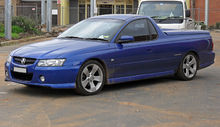This is an old revision of this page, as edited by Mozzie (talk | contribs) at 09:25, 18 October 2014 (Changes across entire document). The present address (URL) is a permanent link to this revision, which may differ significantly from the current revision.
Revision as of 09:25, 18 October 2014 by Mozzie (talk | contribs) (Changes across entire document)(diff) ← Previous revision | Latest revision (diff) | Newer revision → (diff)Diminutive forms of words are used extensively in every day Australian English. While diminutives are generally seen as slang, many forms are used widely across the whole of society in most circumstances. There are over 5,000 identified diminutives.
Usage
Diminutives are usually formed be taking the first part of a word, and adding an a, o, ie, or y. Alternatively in some cases no ending may be used. Diminutives are used very exactly and are not random. For example, an ambo is an ambulance paramedic, and never an ambulance; and is never pronounced ambie or amba. The use of the 'ie' ending, for example in bikie, (a motorcycle club member), does not carry a connotation of smallness or cuteness as it does in other English dialects.

Some diminutives are used almost exclusively except in the most formal of circumstances, while some are rarely used. Others might be restricted to certain demographic groups or locations. The use of diminutives also evolves over time with new words coming into use, and words coming into and out of favour. Some diminutives have become so common that the original form has fallen out of common usage. For example, Salvos has begun to replace the name Salvation Army to such an extent that some Australians do not recognise the Salvation Army name. Deli has become so universal that delicatessen is rarely used. Some words, such as ute, from utility vehicle, a car with a tray back, has become universal.

Some diminutives are rarely used, but widely recognised. For example, chalkie means teacher, however most Australians simply call a teacher a teacher.
Diminutives are often used for place names, and are only recognised by people in the local area. Pub and hotel names in particular are often shortened.
List of Diminutives
- Abo, and indigenous Australian. From Aboriginal. Considered highly offensive.
- Agro, aggressive or angry.
- Ambo, an ambulance paramedic.
- Arvo, afternoon.
- Barbie, a barbecue, which may refer to either the cooking apparatus itself or the event of cooking food on a barbecue.
- Beautie, beautiful. Used in a much wider sense than the beauty
- Bikie, a member of a motorcycle club, sometimes involved in criminal activity. This is equivalent to biker in American English. A motorcycle club is called a bikie club. Outlaw motorcycle clubs are called bikie gangs.
- Bookie, a book keeper.
- Bottlo, a bottle shop/alcohol store.
- Breckie, breakfast.
- Brisie, Brisbane, the capital city of Queensland.
- Brickie, a bricklayer.
- Bundy, Bundaberg, Queensland, also slang for Bundaberg Rum.
- Cab Sav, Cabernet Sauvignon wine.
- Chalkie, a teacher. From chalk used on blackboards.
- Chippie, a carpenter. From wood chips.
- Chockie, chocolate.
- Chrissie or Chrissy, Christmas.
- Compo, compensation for being injured at work. Generally not used for other forms of compensation.
- Cuppa, a up of tea or coffee.
- Deli, delicatessen.
- Dero, a poor person, from derelict.
- Devoed, devastated.
- Doco, a documentary.
- Firie, a fireman.
- Footy, football, which may refer to the sport of football, the ball itself, or a specific game. Generally, footy refers to Rugby League in Queensland and New South Wales, and to Australian Rules Football in the other states.
- Garbo, a garbage collector.
- Greenie, an environmentalist. From the green movement.
- Journo, a journalist.
- Kero, kerosene.
- Kindy, kindergarten.
- Lippy, lipstick.
- Maccas, McDonalds fast food restaurants.
- Metho, methylated spirits.
- Pav, pavolova
- Pollie, a politician.
- Povo, a poor or cheap person. From poverty.
- Postie, a postman or postwoman.
- Preggo or preggers, pregnant.
- Reffo, a refugee.
- Rego, vehicle registration.
- Rellie, a relative.
- Roo, a kangaroo.
- Selfie, a self shot photograph. This term originated in Australia and has been adopted world wide via the internet. It became The Oxford Dictionary's 2013 word of the year.
- Semi, a semi trailer truck.
- Seppo, a derogatory term for an American. Seppo is a diminutive of septic tank which is in turn rhyming slang for yank, which is an abbreviation of yankee.
- Servo, a petrol station, service station.
- Sickie, a sick day.
- Smoko, a smoking break while at work. Since smoking has been banned in many workplaces, a smoko has come to mean any rest break at work.
- Spag bol, Spaghetti Bolognese.
- Sparkie, an electrician. From sparking, electric arcing.
- Subie, a Subaru car.
- Sunnies, sunglasses.
- Super, superannuation. In Australia, all employers are obliged to set aside a percentage of a workers wages in a superannuation fund.
- Surfie, a sufer.
- Suzie, a Suzuki car.
- Tassie, Tasmania.
- Tellie or Telly', television.
- Tradie, a tradesman.
- Trackies, track pants or a track suit. Track pants are also know as trackie dacks, dacks being a colloquial word for trousers.
- Truckie, a truck driver.
- Undies, underwear.
- Uni, university.
- Ute, a passenger vehicle with a cargo tray in the rear
- Vegie, vegetables, generally not a vegetarian.
- Veggo, a vegetarian. Never a vegetable.
- Wheelie bin, a household waste bin on wheels.
- Wino, an alcoholic, from wine.
- Wollies, Woolworths supermarkets.
References
- http://www.australiangeographic.com.au/news/2010/08/why-we-shorten-barbie,-footy-and-arvo
- http://alldownunder.com/australian-slang/dictionary-diminutives.htm
- http://www.abc.net.au/local/audio/2012/09/06/3584725.htm
- http://www.latrobe.edu.au/news/articles/2011/podcasts/how-australians-use-hypocoristics/transcript
- http://blogs.abc.net.au/nsw/2010/07/aussies-diminutives.html
- http://www.abc.net.au/science/articles/2014/08/12/4065062.htm
- http://www.theguardian.com/world/2013/nov/19/selfie-australian-slang-term-named-international-word-of-the-year